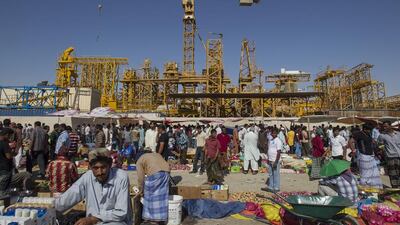Abu Dhabi // Piles of fruit, rows of vegetables and stacks of fish are for sale, with tailors, barbers and butchers calling out for customers.
No, this is not a typical farmers' market – but a regular Friday bazaar outside an Abu Dhabi labour camp.
Thousands of workers arrive from early morning, some of them to buy and others to sell.
These men earn as little as Dh500 a month, inflation is rising and overtime is drying up, which is why these markets are so vital for them.
“We buy from here because commodities are cheaper, compared to supermarkets,” says Mohammed Shakir, 25, a plumber from India who earns Dh700 a month and has lived in the industrial area of Mussaffah for six years.
“We come here every Friday for shopping and buy a week’s stuff.
“Before there used to be overtime, which has now dried up. So on this small salary, what would we save if we buy stuff from supermarkets? We want to buy from there but our pockets do not permit.”
For example, Mr Shakir says that “onion and garlic we get here for Dh1 a kilogram, but in the supermarket it is Dh2.50 a kg.
“I know the commodities here are not good, but we are poor.”
The National visited the three main labour camps in Abu Dhabi – International City Abu Dhabi, or Icad, and the Workers Village, both in Mussaffah, and Al Mafraq Workers City 2, known as the Baniyas labour camp.
About 26,000 workers live in the Icad camp and thousands more at the others. The largest bazaar is outside the gates of the Icad camp.
There are part-time fruit and vegetable traders, labourers-turned-butchers, animals slaughtered that day at the camp, fish stalls, ad hoc tailoring and even amateur barbers.
Most of the people who set up the stalls have regular jobs, buy the goods from other larger markets, such as at Mina port, and then sell them on to supplement their wages.
However, other items are on sale illegally: naswar, a type of snuff favoured by many Pakistanis, and paan, also known as betel leaves, a mixture of lime and tobacco chewed by Indians, Pakistanis, Bangladeshis and Nepalis.
Mohammed Islam, a worker from Bangladesh, is selling paan at the Baniyas labour camp for Dh1 a piece. “I earn Dh600 a month and sell paan to support my expenses,” says Mr Islam, who can make about Dh100 in a day.
Labourers say living conditions inside camps have improved significantly over the past few years, with better sanitation, food quality and cleanliness. There are also supermarkets for workers, but many still prefer the outside bazaar despite the lack of health-and-safety precautions.
“Most of the poor workers buy mutton from here. Labourers-turned butchers shout ‘fresh meat’ but they mostly slaughter sick goats,” says Ahmed Al Syyed, 26, from Egypt, who works as a storekeeper for a company in the capital.
“I don’t buy foodstuff from here. Today I just came to buy trousers. Every Friday market is like that and most of the commodities are not good here. The situation here is very bad. Insects, flies are around the mutton.”
However, the stalls selling meat on Fridays over the past few months had many customers.
“I bring these goats from Baniyas and slaughter them here and sell for Dh25 a kilogram,” says Taher, a Bangladeshi who earns about Dh800 a month at another job. “Every Friday I sell about three goats.”
At a regular butcher, mutton can cost up to Dh35 a kilogram.
Sanaullah, a technician from Bangladesh, is shopping for fruit and vegetables – ladyfinger, lemons, onions and cherries.
“Cheaper, fresher and tastier,” he says. “It is all fresh. I get it cheaper here. Goats are there in front of you and then they slaughter them. If they are sick, who would buy them?
“In a supermarket, you find meat and fish stockpiled for months and a year, whereas what they sell fresh for the day, who knows. Sometimes they change dates too.”
So for now, the unofficial markets are thriving.
“Come, come, take fresh meat,” says Bangladeshi Suroor Bakhsh, calling out his rates for beef at Icad to dozens of labourers.
“If you want to buy, take it – otherwise move ahead.”
anwar@thenational.ae

